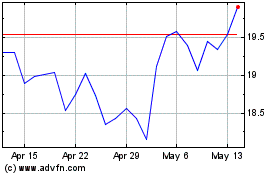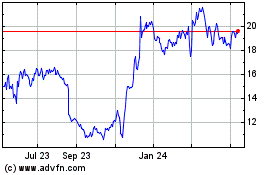By Anne Steele
Macy's Inc. said revenue will continue to decline this year as
it works on ways to improve sales and draw in more customers who
are increasingly using the internet to plan and make their
purchases.
During the December quarter, sales at Macy's stores open at
least a year fell 2.1%, not as bad as the 2.9% decline in the
year-ago fourth quarter and the 2.2% decrease analysts expected.
Still, it marked the eighth straight quarterly decline.
Earnings, meanwhile, came in better than Wall Street estimates,
and Macy's shares edged 0.8% higher midday to $32.55. Still, they
are down by one-fourth in the past three months.
Foot traffic continues to dwindle at brick-and-mortar retailers
as more shoppers are shifting more sales online.
Last month, Macy's said it would slash more than 10,000 jobs and
detailed plans to close dozens of stores after another holiday
season of weak sales, providing more evidence that department
stores have lost their once-central place in American
retailing.
Chief Executive Terry Lundgren, on his last investor call at the
helm, said 2016 "frankly wasn't the year we expected nor hoped
for."
However, the department store made significant progress on key
initiatives "that are starting to bear fruit," including improved
digital platforms, the rollout of a new approach to fine jewelry
and women's shoes, an increase in exclusive merchandise and the
refinement of the clearance and off-price strategy.
"We also took a big step forward in rightsizing our physical
footprint and restructuring our entire organization," said Mr.
Lundgren.
The company, which closed 66 stores during fiscal 2016 and plans
to close another 34, said it received $673 million in cash from
real-estate transactions last year and continues to explore options
for its properties, including redeveloping some as hotels or
condos.
Macy's expects sales in fiscal 2017 to be down between 3.2% and
4.3% -- less severe than the 4.4% decline analysts polled by
Thomson Reuters have forecast. Adjusted earnings are expected
between $2.90 to $3.15 a share, bracketing the average analyst
estimate for $3.05 a share.
Karen Hoguet, Macy's finance chief, said guidance "reflects the
desire to test and learn before we roll out initiatives nationally"
and the department store anticipates "little to no sales
improvement" meanwhile.
Over all for the fourth quarter, Macy's earned $475 million, or
$1.54 a share, down from $544 million, or $1.73 a share, a year
earlier.
Excluding impairments, store closings, settlement charges and
other costs, per-share profit fell to $2.02 from $2.09.
Sales slipped 4% to $8.52 billion.
Analysts, polled by Thomson Reuters, predicted $1.96 in earnings
per share and $8.62 billion in revenue.
Gross margin expanded to 38.3% from 37.4%.
Ms. Hoguet said in-store sales continued to be below what the
company expected.
"Clearly customers are choosing to purchase less in-store and
more through digital means," she said.
Macy's management said in the earnings report and on the call
that changes need to be more dramatic and made faster. But
executives also emphasized 2017 would be a year for testing new
concepts before rolling them out nationally. That includes new
merchandise and entertainment options, enhanced technology, updated
marketing and a simplified pricing structure.
Ms. Hoguet said Macy's is testing strategies to move away from
coupon reliance, but added "we all know making dramatic changes in
coupons is not good."
Mr. Lundgren pointed to more-organized customers entering stores
with mobile devices and making their decisions before they leave
their homes or cars.
"They've already done their homework and searches for what they
want to buy and where they want to buy it," he said. "They're
visiting fewer stores once they get to the mall -- we have to be
top of mind in that search process for them and make sure we match
up well."
Earlier this month, The Wall Street Journal reported Canada's
Hudson's Bay Co. has approached Macy's about a takeover, as the
biggest U.S. department-store chain grapples with disappointing
results and restive shareholders. There was no mention of any
discussions in Tuesday's report.
Hudson's Bay is an acquisition-hungry owner of marquee names in
retail including Lord & Taylor department stores and Saks Fifth
Avenue. While its market value is dwarfed by that of Macy's,
Hudson's Bay could raise equity and debt against its real-estate
portfolio, which could be worth $14 billion, according to people
familiar with the matter.
Write to Anne Steele at Anne.Steele@wsj.com
(END) Dow Jones Newswires
February 21, 2017 13:16 ET (18:16 GMT)
Copyright (c) 2017 Dow Jones & Company, Inc.
Macys (NYSE:M)
Historical Stock Chart
From Mar 2024 to Apr 2024

Macys (NYSE:M)
Historical Stock Chart
From Apr 2023 to Apr 2024
